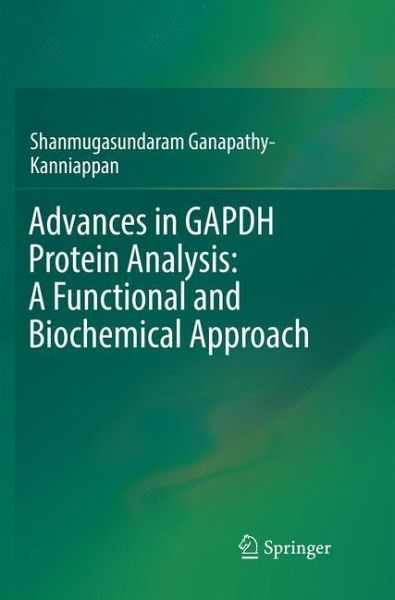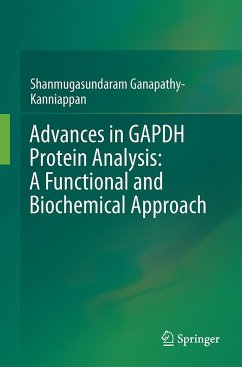
Advances in GAPDH Protein Analysis: A Functional and Biochemical Approach
Versandkostenfrei!
Versandfertig in 6-10 Tagen
76,99 €
inkl. MwSt.
Weitere Ausgaben:

PAYBACK Punkte
38 °P sammeln!
This book presents modern and classic analytical approaches that are crucial for the biochemical and functional characterization of the archetypal protein, glyceraldehyde-3-phosphate dehydrogenase (GAPDH). The distinguishing feature of the book is that it covers, in addition to other methods, some of the uncommon but valuable techniques as well. For example, in-gel visualization of enzyme activity, immunoblotting protocols for native (non-denatured) proteins, and proteins resolved by pH-gradient [IEF-isoelectrofocusing], etc. These expedient methods are relevant and vital for the verification ...
This book presents modern and classic analytical approaches that are crucial for the biochemical and functional characterization of the archetypal protein, glyceraldehyde-3-phosphate dehydrogenase (GAPDH). The distinguishing feature of the book is that it covers, in addition to other methods, some of the uncommon but valuable techniques as well. For example, in-gel visualization of enzyme activity, immunoblotting protocols for native (non-denatured) proteins, and proteins resolved by pH-gradient [IEF-isoelectrofocusing], etc. These expedient methods are relevant and vital for the verification of biochemical properties of GAPDH, or similar protein of interest.
This work outlines detailed protocols that are essential to investigate classical (cellular) and recently reported extracellular (secretory) isoforms of GAPDH. Precisely, the book covers techniques pertinent to enzymatic and non-enzymatic analysis of GAPDH that include, but not limited to, electrophoretic mobility shift assay (EMSA), two-dimensional (2D)-immunoblotting, immunofluorescence/confocal microscopy, mass spectrometry, ion-exchange and affinity chromatography.
Readers will discover the importance of the experimental methods described in the book as they relate to the evaluation of the role and significance of GAPDH. Furthermore, majority of the methods described in the book have also been validated in the author's laboratory, besides other research groups worldwide, underlining the repeatability and reproducibility of the protocols. Each method begins with an abstract and a brief background emphasizing its application and relevance. This will enable the readers to determine the choice of experimental design according to their research objectives.
The book explains the methods systematically with ample illustrations to facilitate quick and easy comprehension of the practical knowledge. Although the book is focused on GAPDH, many of the protocols may be adopted to other proteins or enzymes with minimal modifications. Noteworthy, it is unequivocally established that GAPDH is a multifunctional protein involved in several cellular processes of health & disease conditions. Hence, this book will be a valuable practical guide for young researchers, scientists and clinician-scientists.
This work outlines detailed protocols that are essential to investigate classical (cellular) and recently reported extracellular (secretory) isoforms of GAPDH. Precisely, the book covers techniques pertinent to enzymatic and non-enzymatic analysis of GAPDH that include, but not limited to, electrophoretic mobility shift assay (EMSA), two-dimensional (2D)-immunoblotting, immunofluorescence/confocal microscopy, mass spectrometry, ion-exchange and affinity chromatography.
Readers will discover the importance of the experimental methods described in the book as they relate to the evaluation of the role and significance of GAPDH. Furthermore, majority of the methods described in the book have also been validated in the author's laboratory, besides other research groups worldwide, underlining the repeatability and reproducibility of the protocols. Each method begins with an abstract and a brief background emphasizing its application and relevance. This will enable the readers to determine the choice of experimental design according to their research objectives.
The book explains the methods systematically with ample illustrations to facilitate quick and easy comprehension of the practical knowledge. Although the book is focused on GAPDH, many of the protocols may be adopted to other proteins or enzymes with minimal modifications. Noteworthy, it is unequivocally established that GAPDH is a multifunctional protein involved in several cellular processes of health & disease conditions. Hence, this book will be a valuable practical guide for young researchers, scientists and clinician-scientists.












